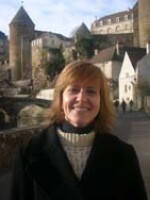MARY LOUISE KELLY, HOST:
To France now, where voters go to the polls this weekend to choose a new president. Tomorrow's the first round. Eleven candidates will be whittled down to two. And right now, the race is a four-way dead heat. NPR's Eleanor Beardsley is in the streets of Paris, and she's on the line now.
Good morning, Eleanor.
ELEANOR BEARDSLEY, BYLINE: Good morning, Mary Louise.
KELLY: Where exactly are you? What can you see?
BEARDSLEY: Well, I'm at a cafe just off the Boulevard Saint-Germain
KELLY: Sounds lovely - having your own cafe au lait or I guess your...
BEARDSLEY: Absolutely.
KELLY: Yeah. Good, good. What's the mood there?
BEARDSLEY: People are, you know, nervous, and they're apprehensive. And many are still undecided. We've got four candidates really in a dead heat with starkly different visions for the country. In first place is a new candidate, 39-year-old Emmanuel Macron. He's never been elected to office. He created his own political movement. He's innovative. He's pro-EU. He wants to be open and do new things for France. Right under him as far-right leader Marine Le Pen. She's nationalist. She wants France out of the EU. She wants to close borders.
Right after her is Francois Fillon. He's the only establishment candidate. He's a mainstream conservative, but he's tainted by scandal that he may have created a fake job for his wife. He's actually under investigation. And then a candidate who's risen in recent days is far-left firebrand Jean-Luc Melenchon. He's a brilliant speaker, charismatic. And many young people, you know, love him. He's being called the French Bernie Sanders, although he's much farther to the left.
KELLY: OK. So that's the slate of the four leaders at the front of the pack.
BEARDSLEY: Right.
KELLY: How has this latest terror attack changed the landscape? This was the shooting on the Champs-Elysees right in the heart of Paris Thursday night.
BEARDSLEY: Right. It just sort of reminded everyone that France is still under threat, and it's in a state of emergency. We've seen the two conservative candidates, Francois Fillon and Marine Le Pen, really trying to play this to tout their law and order platforms. They both say that they're the only ones who can really defeat the terrorists, you know, that have been attacking France. But the prosecutor actually said this guy was not a radicalized individual. And analysts also think it could make some voters rethink their support for Emmanuel Macron because he's too inexperienced. And they may think - well, I like him, but in these dangerous times, we can't go with him.
KELLY: Speaking of Macron, one other little development to inject into the mix - Barack Obama called Macron this week. How'd that go?
BEARDSLEY: Well, that was actually a coup for the Macron campaign because Obama is still pretty popular in France. And although Obama didn't, you know, explicitly endorse Macron, it was obviously an endorsement for the EU because he told him, Europe is important to America. And because everyone is fearful that Le Pen will take, you know, France out of the EU, which would actually probably destroy it - France and Germany are founding members. It's not like Britain. I mean, analysts say if France leaves the EU, it can't survive. And Marine Le Pen wants to do that.
But actually, Mary Louise, everyone's talking about being scared of Le Pen because she's going to make it to the second round. But all polls show her actually losing in the second round. And I spoke with a Parisian on the street, and she said - this is Anne Laurence (ph) who says Le Pen is not her main fear.
ANNE LAURENCE: I'm not afraid of Le Pen because I think that a lot of people from the right and the left will vote against Marine Le Pen. So I'm not afraid of Marine Le Pen, but I'm very scared to have Fillon, for example, because if I have the choice between Fillon and Le Pen, I will have to vote Fillon. And I hate this man (laughter).
BEARDSLEY: So Mary Louise, a lot of people are saying in this election, you can't really vote for who you want. But you have to vote for who you dislike the least because it really matters. This is one of the most important elections in 50 years in France.
KELLY: That's NPR's Eleanor Beardsley updating us on this very important election unfolding tomorrow. She's out prowling the streets of Paris. Eleanor, thanks so much.
BEARDSLEY: You're welcome, Mary Louise. Transcript provided by NPR, Copyright NPR.





